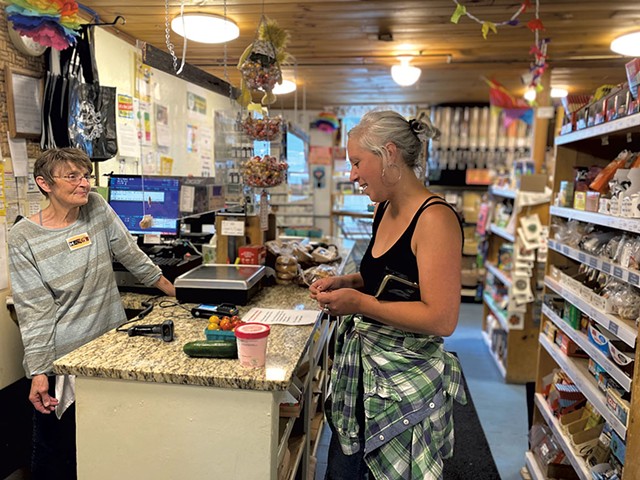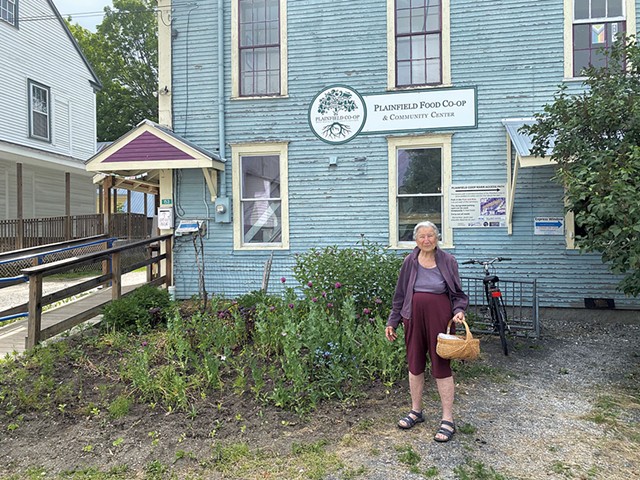Switch to the mobile version of this page.
Vermont's Independent Voice
- News
- Arts+Culture
- Home+Design
- Food
- Cannabis
- Music
- On Screen
- Events
- Jobs
- Obituaries
- Classifieds
- Personals
Browse News
Departments
-
Education

Scott Official Pushes Back on Former State…
-
News

Burlington Budget Deficit Balloons to $13.1 Million
-
Education

Senate Committee Votes 3-2 to Recommend Saunders…
- Court Rejects Roxbury's Request to Block School Budget Vote Education 0
- Norwich University Names New President Education 0
- Media Note: Mitch Wertlieb Named Host of 'Vermont This Week' Health Care 0
Browse Arts + Culture
View All
local resources
Browse Food + Drink
View All
Browse Cannabis
View All
-
Culture

'Cannasations' Podcaster Kris Brown Aims to 'Humanize'…
-
True 802

A Burlington Cannabis Shop Plans to Host…
-
Business

Judge Tosses Burlington Cannabiz Owner's Lawsuit
-
Health + Fitness

Vermont's Cannabis Nurse Hotline Answers Health Questions…
-
Business

Waterbury Couple Buy Rare Vermont Cannabis License
Browse Music
View All
Browse On Screen
Browse Events
Browse Classifieds
Browse Personals
-

If you're looking for "I Spys," dating or LTRs, this is your scene.
View Profiles
Special Reports
Pubs+More
Plainfield Debates How to Save Its Beloved but Financially Troubled Co-Op
Published July 6, 2022 at 10:00 a.m. | Updated July 27, 2022 at 8:59 a.m.
The placid scene at the Plainfield Co-op on June 29 betrayed not a hint of crisis: A customer compared organic cheese prices in the back of the store, Paul McCartney and Wings' "Band on the Run" played over a speaker, and in the back, a heap of locally grown arugula awaited bagging.
Margie Yoder was running the cash register. Paula Emery, her coworker for the evening, shouted across the one-room grocery store that a delivery of specialty ice cream had arrived. Yoder cut short a conversation with a customer — her landlord — about new composting regulations. "We're having a frozen-item emergency right now," Yoder announced, half-jokingly, as she turned to help Emery.
Yoder soon returned to bagging items for her customer. Now the conversation took on a somber tone. "Are you going to the meeting tonight?" Yoder asked the woman. "The co-op is in big trouble."
Like many other beloved small-town institutions across Vermont, the co-op has been coping with dwindling sales due to the one-two punch of pandemic-related restrictions and the subsequent labor shortage. On top of that, nearby competitors such as the Hunger Mountain Co-op in Montpelier had carved into its business over the past few years.
Last year, sales topped $795,185, but the co-op still posted a loss: $38,713 to be exact, according to the treasurer's report.
Now the co-op faces a fresh existential threat: the looming partial shutdown of the Main Street bridge connecting Plainfield — and therefore the co-op — to Route 2. Repair work on the bridge deck, which has been corroded by salt and water, is tentatively scheduled to start mid-July after being put off for years, and traffic will be reduced to a single lane.
That may not sound like a big deal. But when a lane on the bridge was closed last year for three months to accommodate inspection work, co-op sales plummeted by $65,000. Now, residents of Plainfield are plotting ways to respond to the threat, determined to keep their charming grocery afloat as its 50th birthday approaches this fall.
The co-op is one of the oldest in the state. It had humble beginnings as a passion project of back-to-the-landers who wanted to live in accordance with their environmental and social values. Plainfield was especially appealing to a new generation of thinkers, helped in part by its proximity to forward-thinking institutions like nearby Goddard College.
Locals wanted a way to bulk order organic staples as a neighborhood. The buying trips started in 1971, when "we began by 'gangin' up' with other co-ops statewide and going down to New York and Boston," Jim Higgins, a longtime co-op member, wrote on the nonprofit's website.
In 1972, the co-op moved to Montpelier and became the Hunger Mountain Co-op. Some of the early founders, though, reopened the Plainfield-based co-op in the former Grange Hall. Residents missed having a grocery close to home. Since then, the member-owned and operated enterprise has provided fresh produce and bulk goods to community members and matured into an iconic Vermont establishment.
The jam-packed store acts as a living, breathing exhibit of the residents' eclectic tastes and sensibilities: In a back corner is a robust bulk-herbs section with harder-to-find items like Cajun blackened seasoning. Behind the registers is a play area for children, complete with an in-store tree house. Niche goods such as ceremonial yerba mate straws and locally produced tinctures for common ailments share shelves with sensible staples, including organic black beans and bulk quinoa. Also for sale are postcards, patches and décor created by local artists.
Jerome Lipani, who was showing an exhibit of collage and paintings, "Visual Fugue," in the Community Center — a much-loved space on the floor above the co-op — thinks the little grocery is unique in its history of supporting the arts and theater. He remembers Bread and Puppet Theater performances in the upstairs space and even a successful effort in the '80s to bring a Baldwin piano to the second-floor community center via a forklift and an assortment of helpers.
"I see the co-op as being at the heart of the matter of the revolutionary principles that were celebrated in that period," Lipani said.
The co-op's always been scrappy and adaptable, he said. Since its inception, the community has held other emergency meetings to save it and each time prevailed. But this time, Lipani and others fear, is different.
Perhaps that's why nearly 70 residents showed up at the Plainfield rec field for the emergency meeting later that day. The sky was overcast as people made their way across the lush field to a meeting space next to a gazebo. Residents in lawn chairs and on picnic blankets chatted as they waited for Cat Klarich, president of the board of directors, to put up a sign with the seven cooperative principles (No. 7: Concern for community.) The event had been advertised around town on neon-colored posters that proclaimed in a large font: "The Co-op is in trouble."
"I know what a lot of you are thinking: Like, Again? Didn't that just happen in 2019? Or, We went through that in the '90s! — and I totally get that," Klarich told the crowd.
A woman nodded in agreement as she knitted a hat, and a dog chased a barefoot child across the makeshift stage. Klarich tapped her microphone, which was plugged into a volunteer's Toyota Prius. The vehicle powered off every few minutes, requiring its owner to scurry across the grass to turn it back on.
Klarich continued: "But what's different now is that there's some external forces at work that we have absolutely no control over."
For one, Fox Market, a gourmet grocer, opened in nearby East Montpelier last June. Also in 2021, the co-op suffered costly equipment breakdowns. A freezer died, spoiling $7,000 worth of food. A new compressor cost $5,000.
Worse, people are skipping the co-op in favor of more affordable nearby options, such as Shaw's in Montpelier.
And now the latest headache.
"The bridge closure that was called the elephant in the room for years now?" Klarich told the group. "Well, it's happening."
Meeting participant Betsy Ziegler suggested the board consider a strategy implemented when the co-op was in trouble back in the '90s: lawn sales in the community center.
Rose Paul, treasurer of the co-op, thanked Ziegler. But the co-op was in the red by nearly $55,600, she noted. "I don't think we're doing $5,000 lawn sales to get out of this hole." The co-op has enough credit and savings to pay off its losses, but it won't last long. "We have to do more stringent stuff," Paul said.
"We're not just saying, 'Oh, you guys, like, we just want you to shop more,'" Klarich told the group. "It's like, we really, really need you to help us figure out what we're gonna do."
Board members led attendees in an exercise of imagination during the final hour of the community forum. They broke into groups of 10 to brainstorm how the co-op might survive.
Glenda Bissex, who is 90, has been a member of the co-op for decades. She noodled strategies with others in a breakout group.
"The place means a whole lot to me," she had told Seven Days earlier. "I am retired. I don't go into Montpelier or Barre every day. I can come here for my groceries; I meet my friends here. I mean, it's just, it's local and familiar. It's a friendly place."
Bissex's group discussed the possibility of the co-op buying the Plainfield Hardware & General Store, which is for sale two miles away on Route 2. With plenty of traffic passing by and room for expansion, it seemed like a promising opportunity. Members discussed leasing out some of the space for a café or similar enterprise, if the deal went through.
But some participants voiced concern about no longer being able to easily walk to the co-op in town. Plus, the hardware store has a hefty price tag — it's currently listed online for $1.5 million, which doesn't include its inventory. "When we're on the brink of going under, how can we possibly spend $1.75 million that we don't have?" Bissex asked.
Another group brought up the federal money going into downtown revitalization around Vermont. Maybe the co-op could access funding for downtown enterprises, a participant suggested.
Another group discussed downsizing the store. Maybe it was time to go back to the roots of the operation and just provide good old bulk goods. No frills. Shortened hours. Reduced space.
No one seemed particularly gung ho about that plan.
Before all of the ideas generated could be shared with the larger group and recorded, though, the sky began to darken and thunder rolled overhead. Someone's dog began to bark.
People quickly gathered their belongings and ran back to their parked cars. On the fly, Klarich directed community members to email her what they had come up with. There wasn't time to say goodbye or loiter as it started to rain.
The next morning, Klarich was bouyed by the enthusiasm expressed in the dozen or so emails she had received. Some community members wanted to stay in the current building, which the co-op owns. Others were excited about the prospect of purchasing the hardware store. Some favored a hybrid approach: continuing to use the old building as a community space and grocery drop-off location, while expanding operations into the Plainfield Hardware building.
"It's sort of have your cake and eat it too," Klarich said. She was aware it would be a tall order, but that's never stopped the co-op from trying.
The board will have a follow-up gathering in mid-July. Meanwhile, it is considering a feasibility study about buying the store, using a $29,000 federal grant they got for that purpose.
Klarich says she's been "religiously following" the recent move of the historic Buffalo Mountain Food Co-op to a larger location in downtown Hardwick and thinks that, with enough dedication, the Plainfield co-op could pull off a similar move.
"We've been around for 50 years," Klarich says. "Why can't we take the next step?"
The original print version of this article was headlined "Cooperative Effort"
Related Locations
-
Plainfield Co-op
- 153 Main St., Plainfield Barre/Montpelier VT 05667
- 44.27806;-72.42279
-
 802-454-8579
802-454-8579
- www.plainfieldcoop.com
-
Be the first to review this location!
Related Stories
Got something to say?
Send a letter to the editor
and we'll publish your feedback in print!
Tags: Business, Plainfield, co-op, grocery store, grocer, Plainfield Co-op
More By This Author
About The Author

Rachel Hellman
Bio:
Staff reporter Rachel Hellman covers Vermont towns for Seven Days. She is a 2020 graduate of Washington University in St. Louis, and her work has been published in the Guardian, the Boston Globe and Backpacker. Rachel is a corps member with Report for America, a national service program that places journalists into local newsrooms. Find out more at reportforamerica.org.
Staff reporter Rachel Hellman covers Vermont towns for Seven Days. She is a 2020 graduate of Washington University in St. Louis, and her work has been published in the Guardian, the Boston Globe and Backpacker. Rachel is a corps member with Report for America, a national service program that places journalists into local newsrooms. Find out more at reportforamerica.org.
Speaking of...
-

Outer Spice Café Revives Plainfield’s Maple Valley Café Space
Feb 6, 2024 -

2023 Vermont Holiday Gift Guide
Nov 24, 2023 -

A Spate of Rural Homicides Puts Residents of Small Vermont Towns on Edge
Nov 1, 2023 -

A Storied Life: Plainfield's Country Bookshop Nears the Half-Century Mark
May 24, 2023 -

Rochester Grocery Store to Close, Leaving Residents in the Lurch
Apr 24, 2023 - More »
Comments
Comments are closed.
From 2014-2020, Seven Days allowed readers to comment on all stories posted on our website. While we've appreciated the suggestions and insights, right now Seven Days is prioritizing our core mission — producing high-quality, responsible local journalism — over moderating online debates between readers.
To criticize, correct or praise our reporting, please send us a letter to the editor or send us a tip. We’ll check it out and report the results.
Online comments may return when we have better tech tools for managing them. Thanks for reading.
- 1. Scott Official Pushes Back on Former State Board of Ed Chair's Testimony Education
- 2. A Former MMA Fighter Runs a Wildlife Rehabilitation Center in Cabot News
- 3. Home Is Where the Target Is: Suburban SoBu Builds a Downtown Neighborhood Real Estate
- 4. Burlington Budget Deficit Balloons to $13.1 Million News
- 5. Legislature Advances Measures to Improve Vermont’s Response to Animal Cruelty Politics
- 6. Vermont Rep. Emilie Kornheiser Sees Raising Revenue as Part of Her Mission Politics
- 7. Dog Hiking Challenge Pushes Humans to Explore Vermont With Their Pups True 802
- 1. Totally Transfixed: A Rare Eclipse on a Bluebird Day Dazzled Crowds in Northern Vermont 2024 Solar Eclipse
- 2. Zoie Saunders, Gov. Scott’s Pick for Education Secretary, Faces Questions About Her Qualifications Education
- 3. Don't Trash Those Solar Eclipse Glasses! Groups Collect Them to Be Reused 2024 Solar Eclipse
- 4. State Will Build Secure Juvenile Treatment Center in Vergennes News
- 5. Vermont Awarded $62 Million in Federal Solar Incentives News
- 6. Queen of the City: Mulvaney-Stanak Sworn In as Burlington Mayor News
- 7. New Jersey Earthquake Is Felt in Vermont News









































